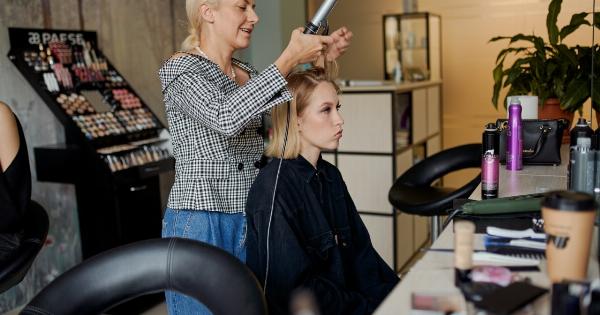Do you struggle with bacne – that’s acne on your back? If so, you may be surprised to learn that your hair products could be the culprit.
While we often think of acne as solely a skin issue, the truth is that the products we use on our hair can have a significant impact on the health of our skin, particularly on our back. In this article, we will explore the potential link between hair products and bacne, as well as provide tips on how to choose hair care items that won’t aggravate your skin.
The Connection Between Hair Products and Bacne
Many hair products, such as shampoos, conditioners, and styling products, contain ingredients that can clog pores and lead to acne breakouts. The primary culprits are:.
1. Silicone
Silicone is a common ingredient in hair products due to its ability to create a smooth, shiny finish. However, silicone is also known to create a barrier on the skin, trapping dirt, oil, and bacteria, which can lead to bacne.
2. Sulfates
Sulfates are foaming agents commonly found in shampoos. While they effectively cleanse the hair, they can strip the skin of its natural oils, leading to dryness and irritation.
This, in turn, can trigger an overproduction of oil, leading to clogged pores and breakouts on the back.
3. Fragrances
Many hair products contain fragrances to create a pleasant scent. However, these fragrances can be irritating to the skin, particularly for those with sensitive skin or existing acne issues. The irritation caused by fragrances can exacerbate bacne.
4. Pore-Clogging Ingredients
In addition to silicone, many other ingredients commonly found in hair products can clog pores and lead to breakouts. These include various oils, such as coconut oil, as well as certain waxes and emollients.
Preventing Bacne Caused by Hair Products
While it can be disheartening to think that your hair care routine may be contributing to your bacne, the good news is that there are steps you can take to prevent these breakouts. Here are some tips:.
1. Read the Labels
When purchasing hair products, read the labels carefully. Look for products that are labeled “non-comedogenic,” which means they are less likely to clog pores and cause breakouts.
2. Avoid Silicone
If you suspect that silicone may be the culprit behind your bacne, try switching to silicone-free hair products. Look for keywords like “silicone-free” or “water-based” on the packaging.
3. Choose Sulfate-Free Shampoos
Opt for shampoos that are sulfate-free. These products are less likely to strip the skin of its natural oils and cause irritation.
4. Opt for Fragrance-Free
If you have sensitive skin or are prone to bacne, choose fragrance-free hair products. This can help reduce the risk of skin irritation and breakouts.
5. Cleanse Your Back Properly
After rinsing out your hair products in the shower, make sure to thoroughly cleanse your back with a gentle cleanser. This will remove any residue that may have transferred from your hair to your skin.
6. Shower After Working Out
If you exercise and sweat, make sure to shower as soon as possible afterward. Sweat combined with hair products can create a breeding ground for bacteria and clogged pores.
Conclusion
While hair products can indeed cause bacne, the good news is that by making a few changes to your hair care routine, you can significantly reduce the risk of breakouts on your back.
Paying attention to the ingredients in your hair products and opting for non-comedogenic, silicone-free, sulfate-free, and fragrance-free options can help keep your skin clear and healthy. Remember, just like with skincare, finding the right hair products that work for both your hair and your skin may require some trial and error. Listen to your skin, make adjustments as needed, and enjoy the benefits of a bacne-free back!.





























